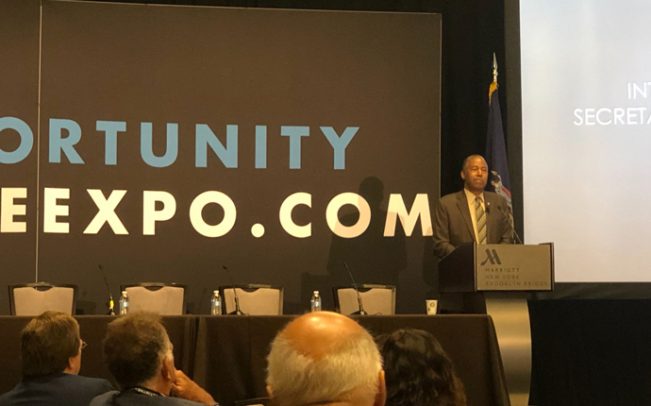Ben Carson is well aware of the complaints directed at federal Opportunity Zones, and how the tax incentive program meant to boost struggling communities may only end up benefiting rich investors and developers.
On Friday, Carson, the Secretary of the Department of Housing and Urban Development, offered his frank assessment of that belief.
“Some people have complained, and said, ‘This is just a mechanism for rich people to get richer,’” he said during a morning talk at the Marriott Hotel in Brooklyn. “Um, news flash, rich people are going to get richer anyway.”

Ben Carson
Carson’s comments, delivered during a keynote speech at the Opportunity Zones Expo, drew scattered chuckles from the audience of investors and real estate industry players. “Can you believe he just said that?” one person in the audience said.
The program, which HUD partly oversees, has designated more than 8,000 census tracts across the U.S. as “distressed.” Investors who develop in those Opportunity Zones can defer federal taxes on capital gains until Dec. 31, 2026. Investors can reduce that tax payment by as much as 15 percent and pay no taxes on possible profits from an Opportunity Zone fund if they hold onto the investment for 10 years. The initiative was part of the 2017 tax overhaul, and by mid-2018 began to catch on with investors.
In March, Carson said HUD will give preference to developers and investors who build affordable housing in Opportunity Zones when it comes to awarding certain grants.
Still, the program has faced criticism for benefiting wealthy investors who are planning projects in neighborhoods not considered distressed, and will instead provide a large return on investment.
In Baltimore, officials there were found to have redrawn an Opportunity Zone to include a development led by Under Armour chief executive Kevin Plank, who had lobbied state officials for the change.
In Chicago, a similar situation emerged after an area that did not meet city guidelines for an Opportunity Zone was later added to include a $2 billion project to redevelop a former hospital, after state officials intervened.
And in New York, Amazon was eligible to offset millions of dollars of capital gains taxes in its failed bid to open a headquarters in Long Island City, where much of the high-rise neighborhood is an Opportunity Zone.
Carson is currently touring the country to promote Opportunity Zones, and on Friday announced updates to the program’s rules.
Developers who redevelop mixed-use buildings in Opportunity Zones will now be eligible to receive Section 220 mortgage insurance for projects that derive up to 30 percent of gross income from commercial space. Previously, that had been limited to 15 percent.
“This will hopefully incentivize private investment, which will spur grocery stores, so we won’t have these food deserts,” Carson said, referring to neighborhoods with a lack of supermarkets.
The Federal Housing Administration is also expected to unveil a new set of incentives for Opportunity Zones, he said, which will lower mortgage and application fees for loans the agency issues.
Carson also promoted the Trump administration’s vision for the program, saying the president intends to “foster the ingenuity of the private sector.”
“There’s no lack of innovation or entrepreneurship in this nation. What gets in the way is the regulations and zoning restrictions,” Carson told the crowd. “That’s what we are working together for.”
